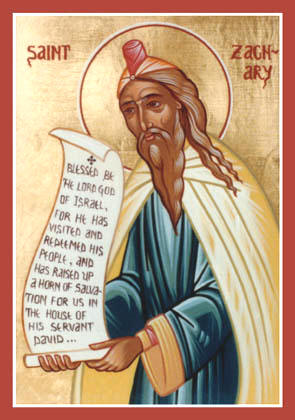 Zachary, a Greek from Calabria, was not only saintly and capable, but one
of those happy people with a gift for making friends. This personal charm
was manifested in the first problem he faced, the recovery of four cities
from the Lombards. Though Liutprand, king of the Lombards, after much
dealing and negotiating, had promised to restore the cities, he did not.
Pope Zachary then went directly to the king with astounding results. Not
only did Liutprand give back the four cities, but he restored the Sabine
estate of the patrimony, and gave the Pope outright some other cities. Pope
and king had dinner together to celebrate, and Liutprand declared that he
had never had so glorious a dinner. The power of Zachary's charm was even
more strikingly revealed when Liutprand began to invade Ravenna.
Zachary, a Greek from Calabria, was not only saintly and capable, but one
of those happy people with a gift for making friends. This personal charm
was manifested in the first problem he faced, the recovery of four cities
from the Lombards. Though Liutprand, king of the Lombards, after much
dealing and negotiating, had promised to restore the cities, he did not.
Pope Zachary then went directly to the king with astounding results. Not
only did Liutprand give back the four cities, but he restored the Sabine
estate of the patrimony, and gave the Pope outright some other cities. Pope
and king had dinner together to celebrate, and Liutprand declared that he
had never had so glorious a dinner. The power of Zachary's charm was even
more strikingly revealed when Liutprand began to invade Ravenna.
The exarch, left without adequate help by the Emperor, cried out for help to
the Pope. Zachary sent an embassy which accomplished nothing. He then went
north to see Liutprand personally. The Pope was received with grateful joy
at Ravenna, but Liutprand, firmly set on taking over the exarchate, tried
to stop him from coming to court. When Zachary refused to be stopped,
Liutprand received him graciously. This time it took argument, but again
Zachary won. Liutprand ended by not only stopping the invasion of Ravenna
but actually restoring territory he had already taken. St. Boniface
continued his great work under Zachary. Christianity was now so far
advanced in Germany that a synod could be held. Not content with his mighty
missionary activity, Boniface, helped by Pippin the Short, worked hard to
reform the Frankish church. Zachary helped him by wise words of cheer and
received with good-humored kindness complaints that Boniface made about
certain matters in Rome.
In the East, Constantine V Copronymus had succeeded his father Leo, but
Constantine was even more devoted to smashing images than Leo. Vainly
did Zachary urge him to return to Catholic orthodoxy.
More successful with the Lombards, Zachary once again checked an invasion.
King Ratchis was dissuaded from carrying fire and sword into Roman
territory. Ratchis soon after abdicated and came to Rome to receive the
monastic habit from Zachary. Another distinguished prince, Pippin's brother
Carloman, had already done the same thing.
In 751 Zachary received a momentous case of conscience from Pippin, the
Frankish mayor of the palace. For years these mayors of the palace had
ruled the Franks while the Merovingian kings vegetated. Now Pippin
determined to dethrone Childeric II, the last of these shadow monarchs, and
mount the throne himself. Before so grave a step, he and the nobles sent to
Pope Zachary for advice. Zachary's famous answer was that he who did the
work of king should be king.
It is no surprise that this genial Pope should be very kind to the poor and
the sick. He was generous to the clergy and did much to restore the Roman
churches. St. Zachary died in March 752. His feast is kept on March 15.
Excerpted from "Popes
Through the Ages" by Joseph Brusher, S.J.

